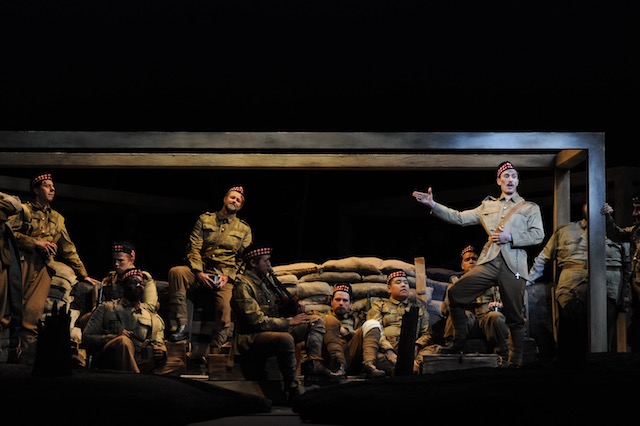
AFM: What do you think it is about this show in particular that has resonated with so many people? How is it different from any other opera show?
MC: Well, it’s a new opera. And there aren’t many new operas. Arizona will be – I believe – the 21st production of the opera since it opened, and not many contemporary operas have that record. With that, I would say there are two things. One, is the story. Right now, this country and maybe even the world, is looking for stories of hope. And I think while Silent Night is a very sad story because the soldiers that did participate in the truces ended up meeting very bad deaths in other battles, at the same time, the opera does remind the audience that peace is possible. That if we work with our better self, we can find peace. The second reason why I think the opera has a successful record, is because of the music. Kevin has written the most incredible, cinematic, emotionally-driven score I’ve heard in the opera house in many years.
KP: I think for one thing the story is really powerful. It’s just an amazing thing that happened and that seems, sort of hard to imagine really. This idea that during a war, during trench warfare – which is known as being some of the bloodiest and most brutal combat – that there could be this moment where the soldiers realize the futility of their situation. And it was quite easy for them to start to come into no-mans-land and share chocolates and Champagne and play soccer. And once they knew each other and they realized that they’re just people across the trench or across the battlefield, it became very hard for them to go back to killing each other. And it then seemed like a very unnatural kind of act. So, I just think that story is very powerful and I hope that we told it well. I felt – when I began the piece – I was truly excited about it. I can feel when something’s going well and I felt good about this one.
AFM: As one of the creators of this opera, I’m sure that it’s important for you to have as many audiences be able to see this production as possible. But is there any reason why you’re excited that it’s coming to Arizona specifically?
MC: I’m really excited because Arizona is doing a production that premiered at the San Jose Opera and this is the fourth or fifth different production of Silent Night, which is another amazing thing, because that’s just unprecedented. But I really liked the San Jose production a great deal. I think that the director made some terrific choices in telling mine and Kevin’s story. Also, Arizona has casted tremendously with really beautiful singers. Another reason is because what’s happening at Arizona Opera is really tremendous and I want to support that.
AFM: Silent Night is Pulitzer Prize-winning opera, which is such a remarkable feat. With that, I have to ask, what does receiving that sort of recognition for your work mean to you?
MC: It’s tremendous, of course. The only dream I ever had when it came to awards was me hoping to get a Pulitzer – which is really ridiculous [laughs]. So, it was way beyond my imagination. I’ve written 28 operas, so I’ve been around. They’ve all gotten little awards and stuff like that – but no other opera has received the Pulitzer. It means so, so much to me.
KP: I mean it’s incredible, but it just goes to show that you really can’t predict anything in your life [laughs]. When something like that happens, then you can never say for the rest of your life that nothing is possible. I mean, you just do your best at everything that you do. I was certainly serious about the work on it. I basically turned down projects for two or three years just so that I could work really well on this one in particular, because I knew it was a giant commission and I knew it was something that I really wanted to do well with. But as far as the success of it goes, it has been totally unpredictable and a wonderful surprise. It really does mean something that the company’s keep wanting to do it and that they find a way to do it. It’s not necessarily an easy or inexpensive thing to do. It’s a big show with a lot of moving parts and there’s a lot of skill and finance that’s required to really make it work.
